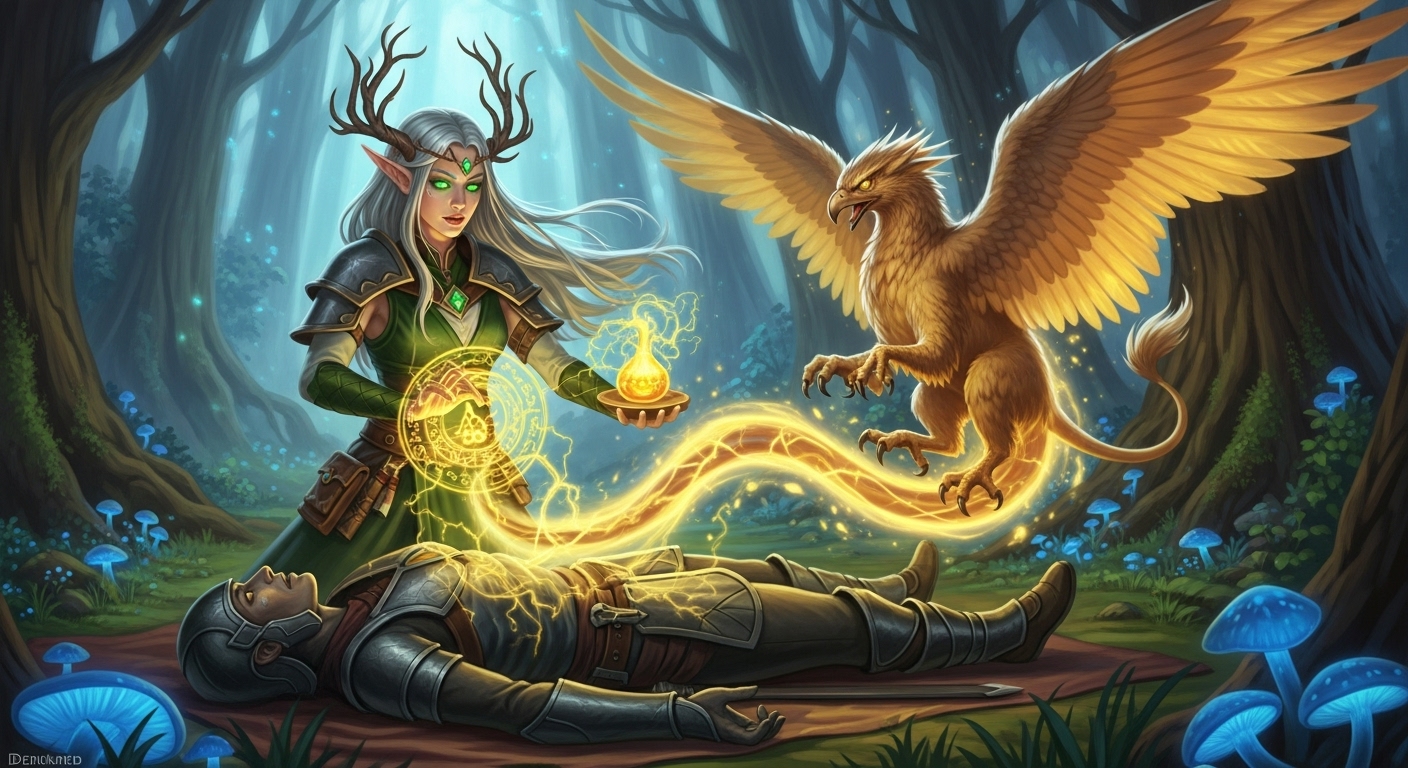Reincarnate

- Level: 5
- School: Necromancy
- Class: Druid
- Casting Time: 1 hour
- Range: Touch
- Components: V, S, M (rare oils worth 1,000+ GP, which the spell consumes)
- Duration: Instantaneous
You touch a dead Humanoid or a piece of one. If the creature has been dead no longer than 10 days, the spell forms a new body for it and calls the soul to enter that body. Roll 1d10 and consult the table below to determine the body's species, or the GM chooses another playable species.
| 1d10 | Species | 1d10 | Species |
|---|---|---|---|
| 1 | Roll again. | 6 | Goliath |
| 2 | Dragonborn | 7 | Halfling |
| 3 | Dwarf | 8 | Human |
| 4 | Elf | 9 | Orc |
| 5 | Gnome | 10 | Tiefling |
The reincarnated creature makes any choices that a species' description offers, and the creature recalls its former life. It retains the capabilities it had in its original form, except it loses the traits of its previous species and gains the traits of its new one.
Tactical Usage
Unique Resurrection Alternative. Reincarnate provides character revival with dramatic transformation possibilities, offering resurrection when traditional methods might be unavailable or unsuitable.
Random Species Assignment. The 1d10 table creates unpredictable outcomes that can fundamentally alter character identity while preserving class capabilities and memories.
Extended Time Window. The 10-day limit matches other mid-level resurrection spells while providing the unique druidic approach to returning life.
Spell Combinations
Identity Adaptation Support. Combining with spells that help adjust to new physical forms or social situations aids in post-reincarnation adjustment.
Protective Enhancement. Pairing with defensive magic helps protect newly reincarnated characters during their vulnerable adjustment period.
Communication Assistance. Language or social magic might help reincarnated characters navigate changed social dynamics due to species transformation.
Material Component Details
Expensive Oil Investment. The 1,000+ gold piece rare oils represent substantial investment, making reincarnation a significant resource decision.
Component Consumption. The consumed oils prevent casual use while maintaining access for important character revival situations.
Druidic Symbolism. Rare oils connect to natural magic traditions and the cyclical nature of life, death, and rebirth in druidic philosophy.
Creator Notes
Dramatic Character Change. Reincarnate creates major roleplay opportunities through species transformation that affects character identity and social dynamics.
Random Outcome Management. The dice-based species assignment requires flexible storytelling that incorporates unexpected character transformations.
Druid-Exclusive Access. The spell's limitation to druids reinforces class identity while providing unique resurrection capabilities.
Environmental Interactions
Species Integration Challenges. New species might face different environmental advantages, disadvantages, or social reception in various locations.
Physical Adaptation Requirements. Different body sizes, senses, or capabilities might require adjustment to equipment, tactics, or daily activities.
Cultural Adjustment Needs. Species change might affect relationships, social standing, or cultural connections that require narrative attention.
Common Rulings & Clarifications
Memory and Personality Retention. Reincarnated characters retain all memories, personality traits, and mental characteristics from their previous life.
Species Trait Exchange. Characters lose all previous species traits and gain the complete trait package of their new species.
Choice Preservation. Player choices about species features are respected in the new form, allowing character customization within species parameters.
Level and Class Continuity. Character level, class features, and learned abilities carry over unchanged to the new body.
Alternative Applications
Voluntary Transformation. Characters might seek reincarnation for desired species changes, escape from curses, or identity concealment.
Political Asylum. Species change might provide escape from persecution, wanted status, or social obligations tied to original identity.
Experimental Character Development. Planned reincarnation creates opportunities for exploring different character concepts within existing campaign frameworks.
Related Spells
Resurrection Magic Alternatives. Raise Dead and Resurrection provide species-consistent revival, while True Resurrection offers more powerful options.
Transformation Magic. Polymorph provides temporary form change, while Reincarnate offers permanent species transformation with resurrection.
Identity Magic. Alter Self and similar spells provide appearance modification, while Reincarnate fundamentally changes character species.
Scaling Analysis
Mid-Level Resurrection. As a 5th-level spell, Reincarnate provides resurrection capabilities with unique druidic flavor and transformation elements.
Resource Investment Value. The 1,000 gold cost makes this spell expensive but accessible for important character revival needs.
Campaign Integration. The spell becomes increasingly interesting as character investment deepens and species transformation affects ongoing stories.
Narrative Flavor
Natural Rebirth Process. The spell should emphasize natural cycles of death and renewal, with new bodies forming through druidic connection to life force.
Species Manifestation. The random transformation offers opportunities for dramatic revelation as the new form takes shape during the resurrection.
Continuous Identity. Despite physical changes, the character's essential self, memories, and capabilities should remain clearly recognizable to reinforce identity continuity.